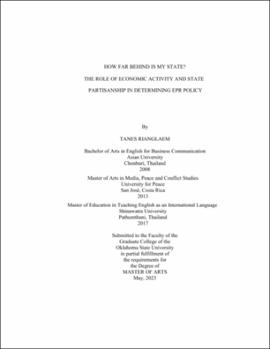| dc.contributor.advisor | Olofsson, Kristin | |
| dc.contributor.author | Rianglaem, Tanes | |
| dc.date.accessioned | 2023-08-25T20:06:27Z | |
| dc.date.available | 2023-08-25T20:06:27Z | |
| dc.date.issued | 2023-05 | |
| dc.identifier.uri | https://hdl.handle.net/11244/338956 | |
| dc.description.abstract | In 2018, the United States Environmental Protection Agency estimated that the total generation of municipal solid waste in the U.S. alone was 292.4 million tons, approximately 25% of which are plastics, glass, and metal materials. Most of these wastes are managed by state and local governments. Extended Producer Responsibility (EPR) systems internalize externalities of municipal waste by forcing manufacturers and importers of plastics, glass and metal materials to take a significant degree of responsibility for the environmental impacts of their products. EPR policy is intended to shift the financial burden of waste management away from consumers and local governments to producers or brand owners. The policy concept is currently more common in European Union countries, where it is mostly regulated within the context of waste electrical and electronic equipment (e-waste), batteries and end-of-life vehicles. In the U.S., EPR policy is not yet widely popular and there is no federal law that requires producers to take such responsibilities; policies have been enacted on a state-by-state basis. This paper, therefore, studies the relationship between adoption of EPR laws and several state internal characteristics: state reliance on the manufacturing sector, business-friendly climate of each U.S. state, and state partisanship between 1991 and 2022. The findings indicate that states that have a friendly-business climate and Republican-controlled governments tend to adopt fewer EPR laws. Results also show that dependency on the manufacturing sector does not influence the adoption of EPR policy and previous adoptions of EPR policy across states poses a positive significant influence over the adoption of EPR laws. These findings enable policymakers to create effective policy to enhance waste management systems and address environmental issues. | |
| dc.format | application/pdf | |
| dc.language | en_US | |
| dc.rights | Copyright is held by the author who has granted the Oklahoma State University Library the non-exclusive right to share this material in its institutional repository. Contact Digital Library Services at lib-dls@okstate.edu or 405-744-9161 for the permission policy on the use, reproduction or distribution of this material. | |
| dc.title | How far behind is my state? The role of economic activity and state partisanship in determining EPR policy | |
| dc.contributor.committeeMember | Jansa, Joshua | |
| dc.contributor.committeeMember | Harvey, Cole | |
| osu.filename | Rianglaem_okstate_0664M_18085.pdf | |
| osu.accesstype | Open Access | |
| dc.type.genre | Thesis | |
| dc.type.material | Text | |
| dc.subject.keywords | environmental policy | |
| dc.subject.keywords | EPR policy | |
| dc.subject.keywords | extended producer responsibility | |
| dc.subject.keywords | product stewardship | |
| dc.subject.keywords | regulatory policy | |
| dc.subject.keywords | state politics | |
| thesis.degree.discipline | Political Science | |
| thesis.degree.grantor | Oklahoma State University | |
